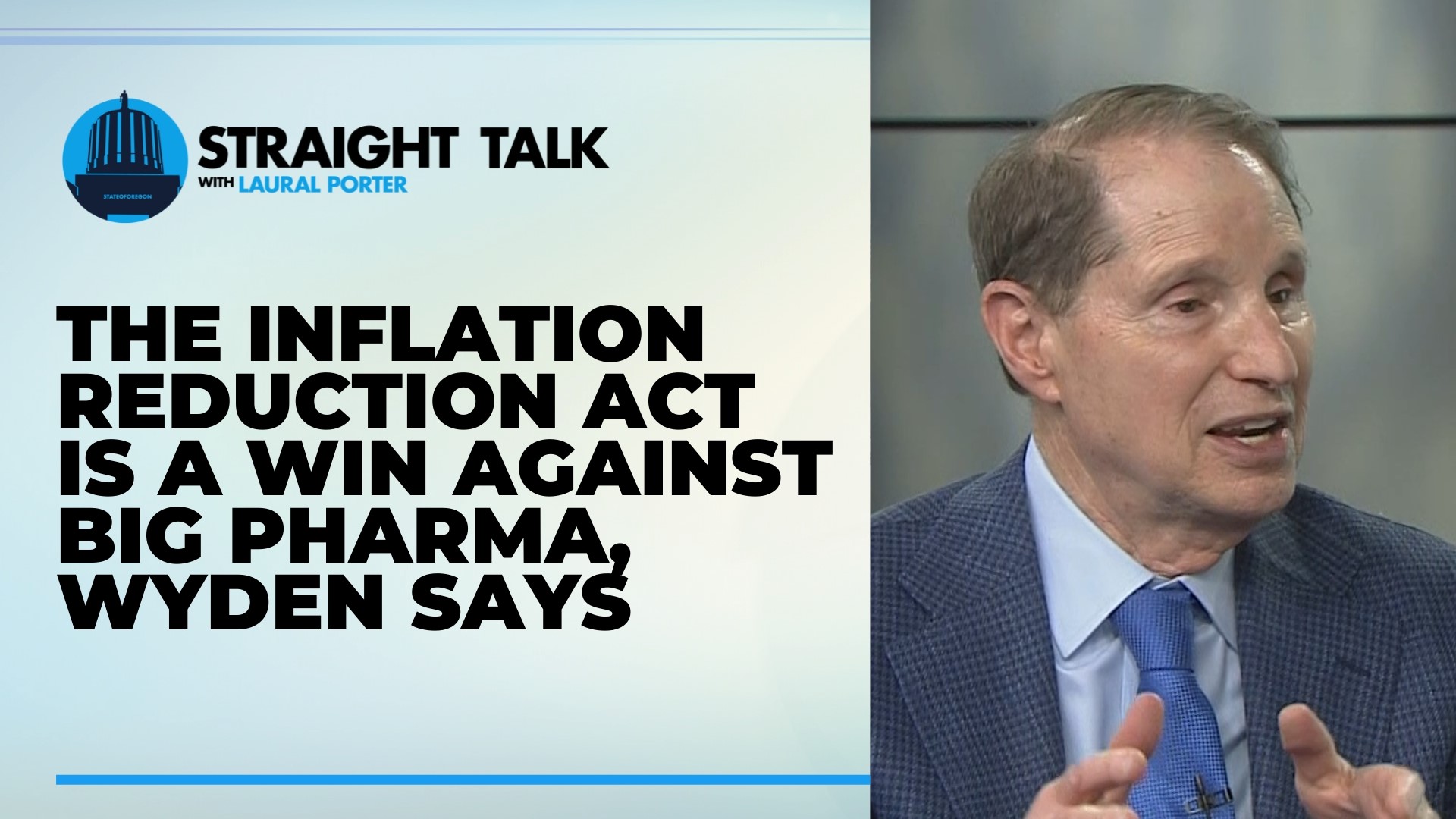PORTLAND, Ore. — Oregon's senior Senator Ron Wyden was at a pharmacy on West Main Street in Medford when President Biden signed the Inflation Reduction Act into law this week.
It was an especially sweet victory for Wyden, who has fought drug companies for decades in an effort to bring down the cost of prescription drugs. He's widely seen as the architect of the measure in the package that will allow Medicare to negotiate drug prices.
"I was telling the seniors (at the Medford pharmacy) that there was a dose of good news," he said. "A big dose of good news for thousands of senior citizens in Oregon and hundreds of thousands across the state, because they were going to get a fair shake, finally, for their medicine."
Wyden was a guest on this week's episode of Straight Talk to discuss how the Inflation Reduction Act will bring down costs for Oregonians, among other topics.
Oregon's other Senator, Jeff Merkley, also discussed the new law when he appeared as a guest on Straight Talk last week.
Beating Big Pharma
Wyden and other Democrats have been pushing to give Medicare the power to negotiate drug prices for decades, ever since President Bill Clinton proposed his health care overhaul in 1993.
Under the Inflation Reduction Act, Medicare will initially be able to negotiate prices for ten drugs. The first round will start with the most expensive like cancer and arthritis drugs, Wyden said, with more added to the list later.
Wyden called the new approach a seismic shift in the relationship between Oregon seniors and Big Pharma, and a long-overdue change to the restriction that prevented Medicare from negotiating.
"Big Pharma guarded that restriction like it was the Holy Grail," he said. "I called the restriction a curse. Now, it has been lifted. The gospel in Washington, DC is 'Big Pharma doesn't lose.' This time, Oregon seniors and folks across the country beat Big Pharma."
The legislation also includes a provision, written by Wyden, that mandates a financial penalty for drug companies if they raise their prices faster than the rate of inflation.
"So, this would mean for the first time since Medicare began in 1965, there would actually be consequences for Big Pharma price gouging," he said. "That sends a pretty powerful message"
Tackling Climate Change
Wyden's fingerprints are on another key part of the Inflation Reduction Act: the provisions to address climate change.
He worked on the Clean Energy for America Act, which passed the House in 2009, but it never came up for a vote in the Senate.
After that failure, Wyden said he and his fellow lawmakers regrouped and turned to market-based, technology-neutral tax incentives to reduce carbon emissions. The result was a re-worked piece of legislation that forms a cornerstone of the Inflation Reduction Act's climate provisions.
"It's market-oriented and there is going to be competition. So, that's why independent experts like the Rhodium Group say families are going to save $500 bucks. The market system gives folks in nuclear, hydrogen, and carbon capture all a chance to compete," he said.
$80 billion to bolster the IRS
The Inflation Reduction Act includes $80 billion for the Internal Revenue Service, more than half of which is designated for enforcement efforts, including hiring more IRS agents to increase audits.
Republicans have attacked the provision, arguing that the audits won't just hit billionaires, but average middle class taxpayers too. Wyden wanted to set the record straight.
"One of the most senior influential Republicans said there would be all these enforcement agents coming in with assault weapons, and the criminal division (of the IRS) said no way are we going to do something like that," he said.
The legislation and the additional audits will go after "wealthy tax cheats," he said, not average taxpayers who pay their taxes with every paycheck.
"They're not the issue," he said. "But these wealthy tax cheats go to their accountants and say 'I don't pay my taxes that way. Help me exploit all of these strategies for avoidance.' That's why a number of billionaires have been able to pay little or no taxes for years."
He also pledged to keep an eye out to make sure the money designated for the IRS is used the way lawmakers intended.
"As chairman of the Finance Committee, I am going to be watchdogging this every step of the way," he said. "So, if I see evidence of what a couple of these senior Republicans falsely said that there would be — all these people with assault weapons coming in — you better believe I am going to get that changed."
Fighting inflation by bringing down costs
Critics and non-partisan analysts like the Penn Wharton Budget Model have said the Inflation Reduction Act will do little or nothing to actually bring down inflation. But Wyden said the inflation improvements will come from bringing down costs for consumers across multiple sectors.
"This cuts costs. And what fundamentally Congress can do that really helps in the fight against inflation is cutting costs," he said.
Those cost reductions include a cap on the cost of insulin for Medicare recipients, reductions in Americans' energy bills and a provision that limits stock buy backs by companies and executives.
Those measures will ultimately reduce the federal deficit, he said, leading to an opportunity to cut borrowing costs for consumers looking to buy things like homes and cars.
Wyden also discussed the recently passed CHIPS Act and how it will benefit Oregon's semiconductor industry, as well as his legislation to discourage price gouging by big oil companies and his efforts to protect women's reproductive health data following the Supreme Court's decision to overturn Roe v. Wade.
In the second segment, Wyden talked about his push to make sure the Portland Trail Blazers stay in Portland.
"Straight Talk" airs Friday at 7pm and Saturday and Sunday at 6:30pm.
"Straight Talk" is also available as a podcast.

